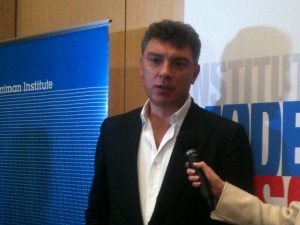
On November 17, 2010, Boris Nemtsov, a leader of the Russian democratic opposition and a former Deputy Prime Minister of Russia, spoke at Columbia University’s Harriman Institute on the current political situation in Russia and his perspective for its future. Echoing his thoughts and research in his recently published pamphlet, “PUTIN: What 10 Years of Putin Have Brought,” Mr. Nemtsov equated Prime Minister Vladimir Putin’s economic policy with Russia’s corrupted state. “If you break corruption, you will break Putin,” Mr. Nemtsov said.
The symbol of corruption in Russia remains the imprisonment of Mikhail Khodorkovsky. Mr. Nemtsov speaks in this video at length about how Khodorkovsky’s imprisonment is an impediment to foreign direct investment and perhaps even more importantly, how freeing Khodorkovsky allows President Dmitry Medvedev the opportunity to break free of Putin’s vertical power chain.
Allegations of corruption on a grand scale continue to dog the Kremlin. Transneft was accused by minority shareholder Alexey Navalny of embezzeling $4 billion during the construction of the East Siberia-Pacific Ocean pipeline. Some of the materials that support his allegations come from mid-level civil servants in the Audit Chamber, perhaps implying that vertical power is most profitable at the top.
Although much is written about the corruption in Russia, estimated by Russian authorities to be between $200 and $300 billion annually, the main indicator for investors is their return on investment.
There was another call today, to remove Russia from the group of emerging market powerhouses, BRIC and replace it with Indonesia. Although a fabricated group of emerging market countries, the allure of BRICs remain and companies from BRIC companies dominate indexes. Indonesia has a younger, growing population, maturing social and political institutions and commitment to education and public health and make it more attractive to foriegn investors. Above all, investors seek growth on their investment, as long as the Kremlin continues to siphon off working capital to grease their vertical power structure, Russia will only continue to be less productive and become less attractive to investors.





